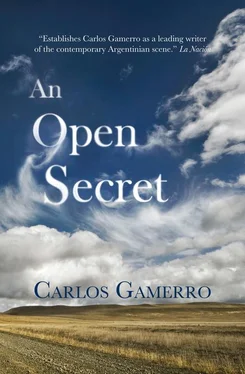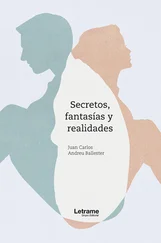Signed — Nora Julia Echezarreta
“Didn’t they ever tell her?” Widower Gius asks me once I’ve finished, folded and put it back in its envelope and its box with the others.
“She died without knowing,” I say.
“WHAT NOW?” asks Guido. My zipped bag lies by his front door, next to the box of Tuttolomondo pasta I’m taking with me as a present, just as I used to every end of summer. I’ve come over from Celia’s because Guido’s insisted on taking me to the bus, which leaves in the small hours.
“I’m ready to go.”
“Aren’t you coming back?”
“Yeah, course I am. But in summer, on holiday, with my family. To be continued … but not here.”
“How does it go on?”
“Greco. I’m going to report him and get his name on all the lists of dirty war criminals. I’ll contact HIJOS in Buenos Aires and Rosario. Maybe we can organise a rally against him. And that’s just for starters. If I can get him on some legal loophole or other I’ll put my lawyer on it. I’ve got plenty of information now. I’d do the same with Neri and Rosas Paz, but the sons of bitches are dead. Whatever. I’ll learn as I go along. It’s not easy at my age, finding out you’re the son of a desaparecido . That’s stuff you go through when you’re twenty. Then there’s the business about filiation. You know Delia had a brother, who lives in Córdoba. I spoke to him to explain the situation and he sounded sort of cagey about it, so just to mindfuck him I asked him if he’d be willing to give blood for a DNA test. He told me he wasn’t. So I offered to go over there and get it from him personally and he reconsidered and said yes. But I don’t know if I’m going to get into all that. I guess not.”
“What about the novel?”
“Eh?”
“At the start you said it was all for a novel. Was that just a cover story?”
“I guess so. I couldn’t come up with anything better. I’ve got this friend who’s a writer and has already written one about the things I told him, and he’s already included a few pages about the town. He was the one who came up with the name Malihuel. And he called you Guido. Maybe he’ll want to write this story too.”
“THERE’S ONE THING I always forget to ask you,” Iturraspe had remarked at one point during my farewell afternoon at Los Tocayos. “Why does everybody call you Fefe? Your name isn’t Federico is it?”
“It’s what Mamá used to call me, then my grandparents and everyone here. From my name and surname, Fe for Felipe — which Mamá later claimed was from Felipe in Mafalda, even though I was born before — and Fe for Félix — not Felix the Cat as some people think — but from my godfather Don Alberto Félix, who gave me his surname. That’s my name. I’m Felipe Félix.”
AT THE END of every summer my grandmother and sometimes my friends — Guido, Mati, Vicentito — would take it in turns to carry my suitcase as far as the corner of the Los Tocayos Hotel-Bar, where the Chevallier bus to Rosario, with a connection to Buenos Aires, used to stop in the evenings. At the end of every side street was the ever-present horizon and over it a half-disc of sun would still be hanging. But by that time the entire town had poured out onto the streets, which still smouldered like embers from the fire of the afternoon. To me, the image of that last walk at twilight through the living streets best captures the peculiar, faltering happiness of those years. That must be why the images of Malihuel are fused in my memory into one quintessential one, identical to all yet to none of them — me walking through the streets of a town that comes to life in summer and catches fire at sundown.
If dawn — when the cool air and lemon-coloured light bring out the outlines and differences between one thing and another, and infuse the town’s early risers with energy — comes in answer to the dark dream of night, evening is a celebration of the end of the red-hot day, when life had to take refuge inside the houses, and the sun and the heat were the sole masters of the deserted streets. At siesta time everything hardens to withstand the sun — the buildings and the trees and even the flowers in the gardens seem to turn to stone, and grin and bear it. The town clenches like a fist, and waits.
Evening is the relaxation of all that pent-up tension. The doors and windows that were sealed against the light and heat are flung wide, releasing the breath held within; and the entire town spills unhurriedly out of its houses, softly, like a hand opening, to walk the sidewalks and streets, ride their bicycles, put their chairs out on the sidewalk, gather on every street corner, in shops and bars, to chat with neighbours. No one stays indoors at that time of day — all the life of Malihuel is out on the streets. As day recedes, the street lights catch fire — dimly, save in the two streets with mercury lamps — and the light of the houses spills yellow out of the open windows and doors, guiding passers-by from one to the other, like Chinese lanterns in a purple dusk. The town lights up as the surrounding fields darken, and it is never more beautiful or more fragile than the moment it seems to ripple over the plain, soft and evanescent like an alcohol flame in a half-lit room. Then, everything is fire — the houses are blue flames and the streets long flaming wicks, the trees torches, the vehicles embers, the people candles that move by themselves as if carried, and even the omnipresent dust, whipped up by the wind from the endless fields, becomes a smoky incense and softens the outlines, perfumed by successive passes of the sprinkler truck. Everything seems momentarily redeemed and justified by the grace of the light — as in Millet’s Angelus , the world is one. It’s nothing but an illusion of course — a hybrid of the magic of the light and the sentimentalism of the observer, who watches it now from the top of the coach that pulls inexorably away, and who could be forgiven for thinking, for a moment while the illusion lasts, that there is no better place on earth to live.












